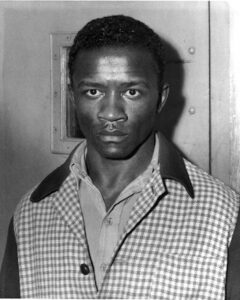
Willie McGee
*The birth of Willie McGee is celebrated on this date in c. 1916. He was a Black laborer who was executed in 1951 after being controversially convicted for the rape of a white woman during the Jim Crow Era.
Early life
Willie McGee was born in Pachuta, Mississippi, to Bessie and Jasper McGee Sr. at 64 3d Red Line, a segregated colored company housing community. McGee attended local, segregated schools before working. He married Eliza Jane Patton on April 15, 1935, and had four children: Willie Earl, Della, Gracie Lee, and Mary. Arrest On November 3, 1945, McGee was arrested in Hattiesburg, Mississippi, for stealing a truck owned by the Laurel Wholesale Grocery, where he was employed. Two of his friends placed him in the vicinity at the time of a rape of a white woman, Willette Hawkins.
On November 9, 1945, McGee was charged with rape after initially admitting that he and Hawkins had had a consensual affair. It was reported that he had made an oral confession shortly after his arrest. The county attorney and other members of the local political power structure attested to this confession. McGee and his supporters later argued that any such confession was made under duress.
In July 1950, Bella Abzug, then a young attorney for the Civil Rights Congress, represented McGee's appeals in Mississippi and before the U.S. Supreme Court in one of her first civil rights cases. Supreme Court Justice Harold Burton ordered the fourth stay on July 26, 1950, creating an international affair; however, the U.S. Supreme Court refused to hear McGee's final appeal. Mississippi newspapers alleged that the segregationist Governor, Fielding L. Wright, was threatened with death by the 'Northern Communists.'
Wright was an ardent white supremacist and segregationist, and these claims of 'Communist Agitation' were commonly used in the Jim Crow South. McGee's legal case became a cause célèbre that attracted worldwide attention, as it was roundly decried as a miscarriage of justice in America. Author William Faulkner wrote a letter insisting the case against McGee was unproven. McGee's supporters quoted his remarks to gather local backing for him. Other public figures who spoke out were Paul Robeson and Josephine Baker.
Execution
The night before McGee was electrocuted on May 8, 1951, by the state of Mississippi, he wrote a farewell letter to Rosetta Saffold McGee.